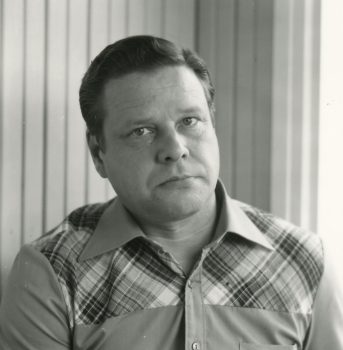On Martti Joenpolvi
Issue 2/1986 | Archives online, Authors

Martti Joenpolvi. Photo: SKS archives
Martti Joenpolvi made his literary debut in 1959 at the age of 23, a young man who had been evacuated twice during the course of the Second World War and had eventually settled in an industrial town in the Häme region of southern Finland.
His first novel, Kevään kuusi päivää (‘Six days in spring’), was in the best tradition of the so-called working-class novel. The book described a young worker’s inner struggles and his quest for life from much the same standpoint as the classic novels of Väinö Linna, Lauri Viita and Toivo Pekkanen.
About ten years later Martti Joenpolvi began to write short stories, which were to prove an important complement to his as a novelist. At the same time he his narrative technique: his use of language become clearer and more.polished, and his unaffected style gained power through the use of symbolism and a dryish wit. At the same time his characters began to move in more middle-class surroundings; these people now had a position in society from which to view the world.
Martti Joenpolvi has just turned 50, and his oeuvre to date consists of fifteen works. Just under half of them are collections of short stories. Leaving aside his first book, mentioned above, Joenpolvi’s novels are Niin musta kuin multa (‘Black as earth’, 1961), Roomalaiset kynttilät (‘Roman candles’, 1963), Jos huonetta et rakenna (‘If you do not build a room’,1965), Yö jona jäät vahvistuvat (‘The night when the ice strengthens’, 1971), Kaikki alennuksella (‘All prices slashed’,1973), Marmoriuni (‘Marble dream’, 1977) and Valkoinen huvimaja (‘The white gazebo’, 1980).
The short story has progressively gained ground in Joenpolvi’s work, and today he is thought of more as a short story writer than as novelist. His first collection of short stories, Johanneksenleipäpuu (‘The carob tree’), appeared in 1967, followed by Kuparirahaa (‘Copper coins’) in 1969, Yksinäisyys (‘Solitude’) in 1975, a selection of short stories entitled Kunniavieras (‘Guest of honour’) in 1979, Kauan kukkineet omenapuut (‘Long-blossoming apple trees’) in 1982, and Haastemies (‘The bailiff) in 1984. Martti Joenpolvi’s complete short stories were published this year.
Short story writer or novelist? Martti Joenpolvi himself describes the difference between the two genres in these terms: ‘If I think of a novel as a sentence, then a short story is the word that expresses the most essential part of the sentence’s meaning.’
Martti Joenpolvi has often been compared to Anton Chekov. He writes a great deal about people he feels close to, their depressions and worries, their bottomless disillusion, about unimportant people, their inhibitions and grudges. Above all, Joenpolvi’s subject is middle-aged men: with delicious irony he paints the portraits of ageing men who clutch an ever dwindling number of life’s trump cards in their hands.
Joenpolvi’s novels may often chart the human mind, but his starting point is highly visual. In his hands the short story is a kind of verbal equivalent of a water colour, or a multi-dimensional landscape of mind and language.
In one respect Joenpolvi undoubtedly merits comparison to Chekov – and to many other masters of his art: in his stories the tragedy and comedy of life go hand in hand. Joenpolvi examines his characters minutely, askance; but he also identifies whole-heartedly with their worlds of emotion and experience. Always his message is thoroughly weighed up and thought out, as polished as it is possible for writing to be.
Martti Joenpolvi’s skill as a short story writer is best represented by Halpa ammattimies (The cheap contractor) from Kauan kukkineet omenapuut. It is closely observed, and clearly derived from the writer’s own experiences. The story tells of a plumber whom the author hires because he has agreed to do the work cheaply. The plumber’s constant failures take on wildly funny overtones; even the narrator sees the funny side, and reader, too, is drawn into the comedy. But it all ends in tears.
But then, life is like that. So are Martti Joenpolvi’s short stories.
Translated by Hildi Hawkins
Tags: novel, short story
1 comment:
Leave a comment
Also by Arto Seppälä
They believe in Father Christmas - 31 December 1982
-
About the writer
Arto Seppälä (b. 1936) is a Finnish author and culture journalist.
© Writers and translators. Anyone wishing to make use of material published on this website should apply to the Editors.

7 November 2017 on 10:07 am
Thank you for the article . it is very helpful .
i will be pleased if you can inform me if there is any translation in french or english of Martti short stories. the only one i red was published in french monthly revue “Europe”1994.
thank you and best wishes